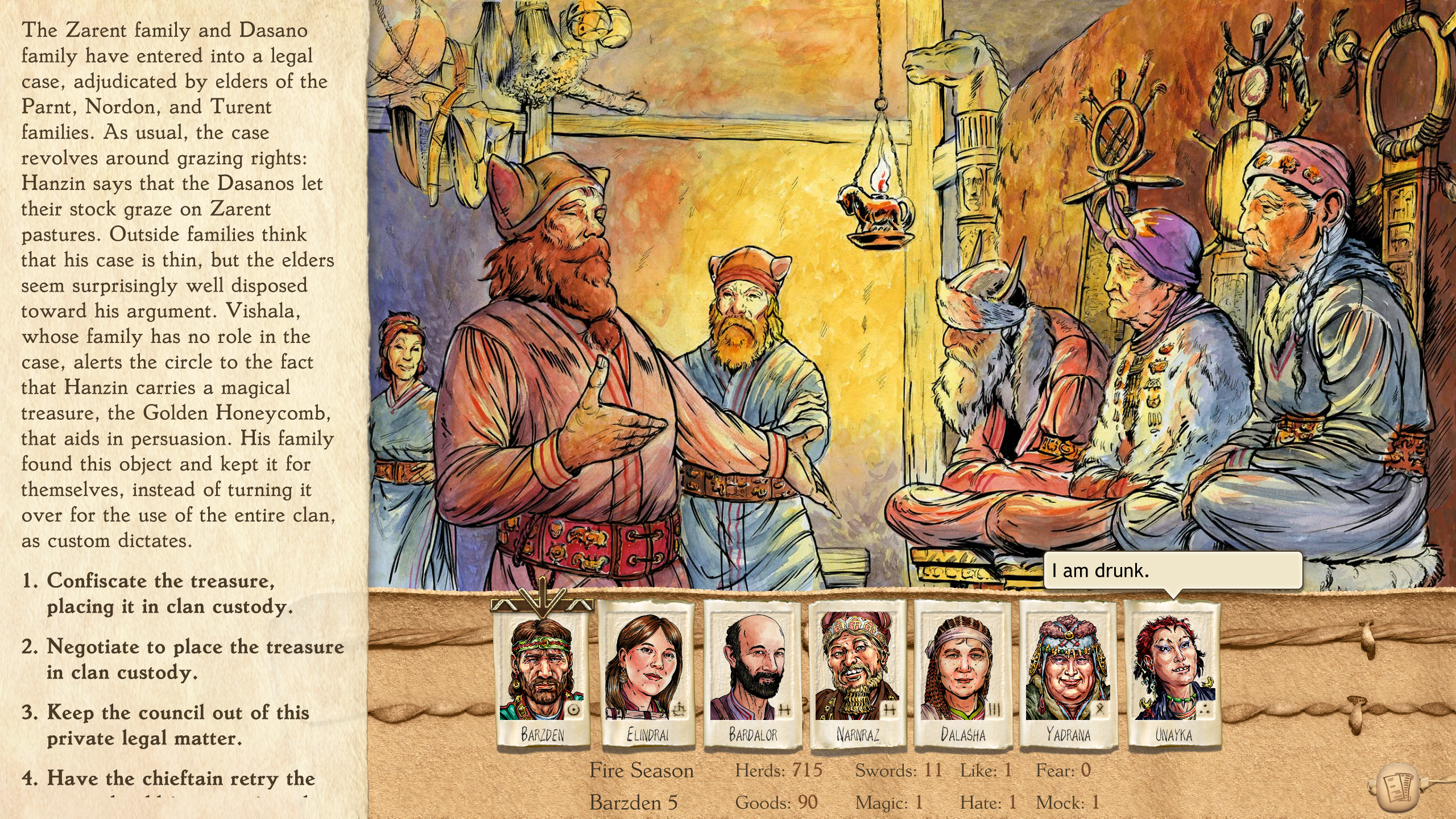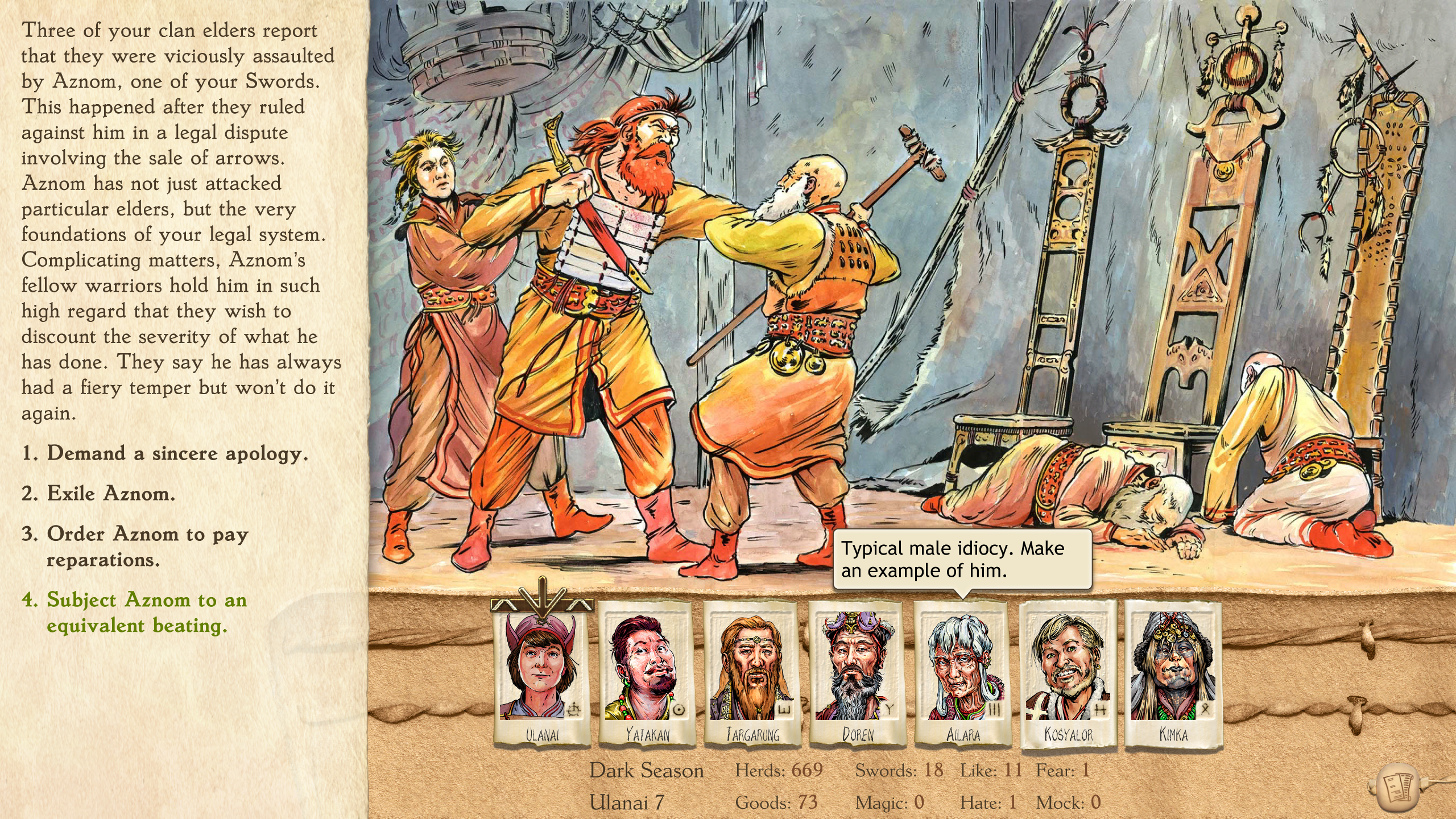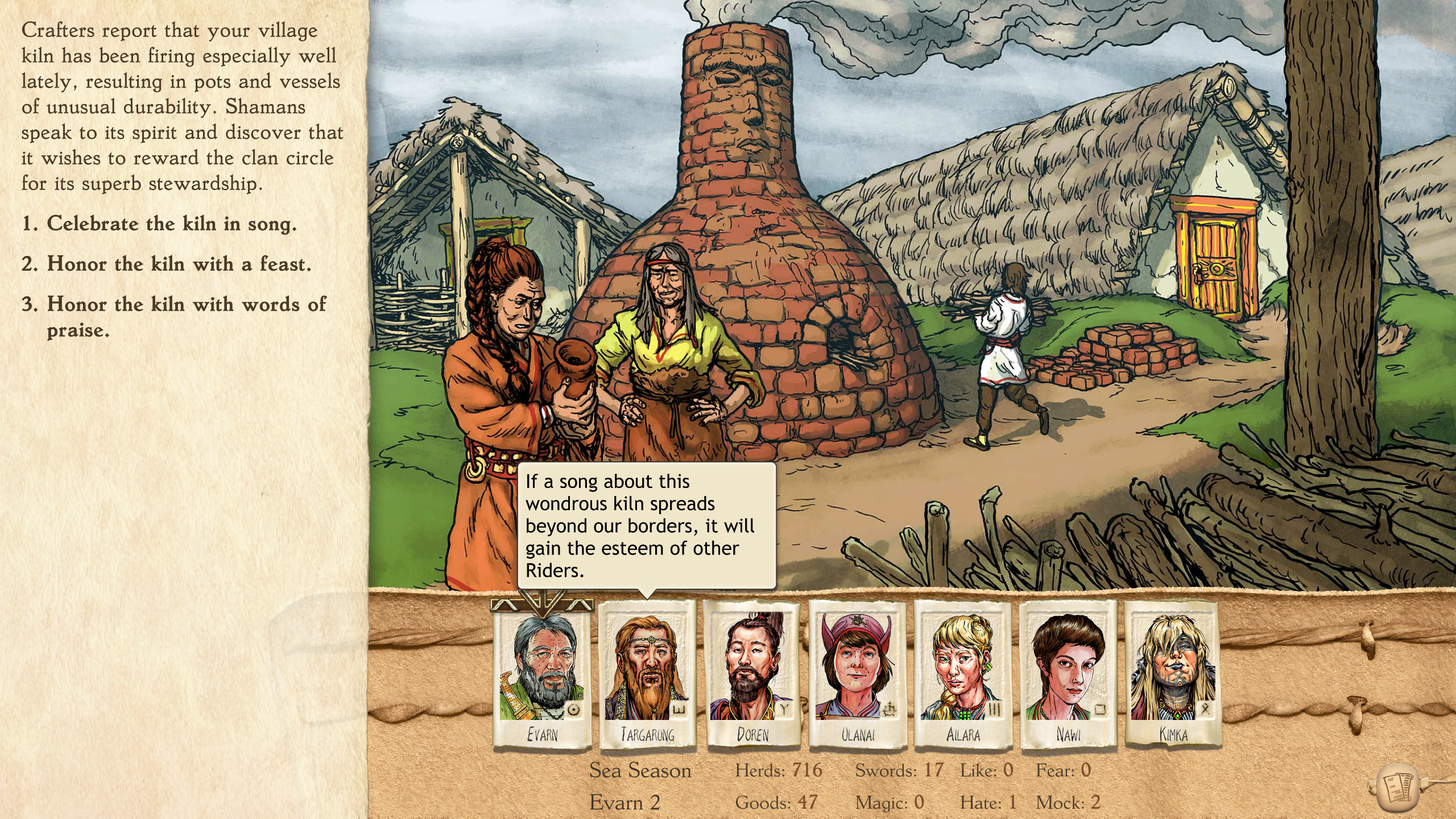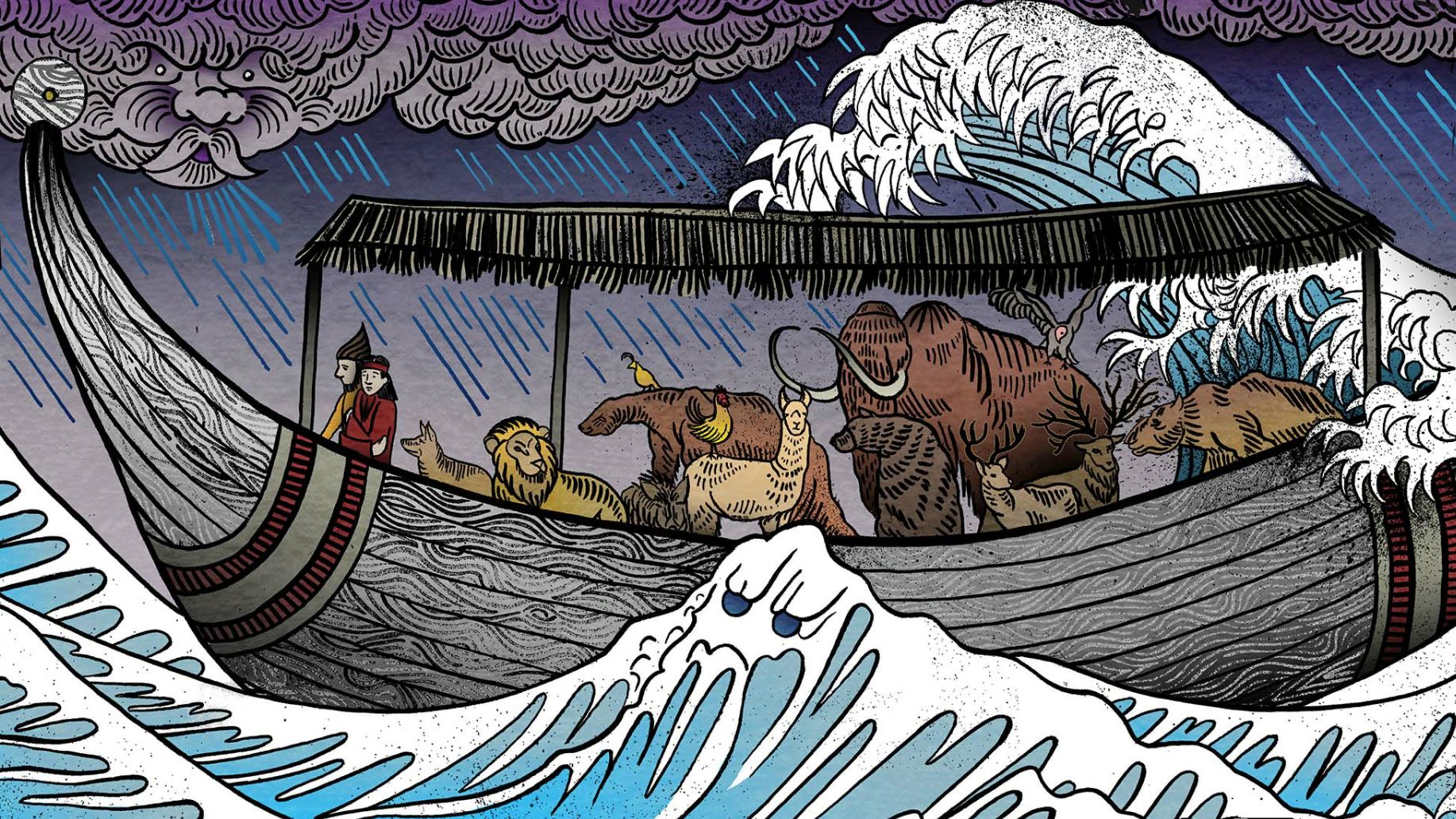Our Verdict
This charming sequel doesn't need flashy new innovations to craft an engrossing adventure.
PC Gamer's got your back
What is it? Visual novel/town management sim
Expect to pay $20/£15.49
Developer A Sharp
Publisher Kitfox Games
Reviewed on Intel i5, 16gb RAM, Nvidia GTX 1660
Multiplayer? No
Link Official site
The council of clan elders look at one another gravely. This year's harvest has been poor and our people need food to make it through the winter. The warmaster, a young fire mage called Yakatan, pipes up: "Perhaps we could raid a nearby clan, and steal their cows?" Trader Targarung counters: "What if instead we took some of our jewellery, and traded it for cows?" Priestess Ailara instead suggests: "We should pray to the goddess of the fields to bless our barley, and make it last longer."
Finally Shaman Kimka makes her suggestion: "How about if we get one of our farmers to put on a mask and prance around pretending to be the cow goddess, until they get transported to a mystical otherworld, commune with the gods, and ask them to beam down 100 cows directly into our fields?" The council rumbles. All these suggestions are very sensible, but in the end I think we're going to go with the mask thing.

Welcome to Six Ages. It's a belated follow up to the 1999 cult oddity King of Dragon Pass, and works the same way: you manage a small clan in an iron age fantasy world, and try to help them prosper by making a series of decisions, largely involving praying to gods and acquiring more and more livestock. It's a sort of hybrid of visual novel and town management game, with large parts played out via little choose-your-own-adventure vignettes, plus town management-esque decisions on various menu screens. Imagine Crusader Kings 2 without the real time strategy overmap, but with even more weird events.
That's probably the best comparison for modern gamers, not just because of the vignettes, but also the emphasis on personality and characters. One of Six Ages' best features is the Clan Circle: an advisory council of characters who chime in on every decision you make. They're all randomly generated, but each one has their own little personality: this one hates elves, this one always wants to stick to tradition. My priestess, Ailara, was an old woman whose comments always amounted to some variation on "ugh, men". Most of the time when you perform an action—such as sending a trade caravan to a neighbouring clan, exploring the nearby mountains, or performing a ritual—one of these characters will be the public face of it. You inevitably get really attached to each character, only to see them catch a stray arrow in battle, disappear while exploring, or just grow old and die.
Let's talk about that ritual at the beginning. This is one of the more unusual aspects of Six Ages—it's set in the world of Glorantha, a board game and RPG setting created by Greg Stafford over 40 years ago in which myth and reality are tightly intertwined. The farmer is both invoking the legend in a muddy field and transported to a mystical otherworld, and a significant part of the game is learning the secrets to these myths so that you can re-enact them correctly. Alternatively, you can go off book, put your own spin on the tale, and possibly create a new interpretation.

If you're familiar with Glorantha—a setting so dense it recently received a two volume encyclopedia detailing the background lore—or Stafford's other RPG work, you'll know it's often concerned with asking the players to embody the ideals of a certain culture or time, and Six Ages is no exception. The game doesn't particularly care if you make 'good' or 'bad' decisions, so long as they are the kinds of decisions that your clan approves of. For example, during clan creation you are asked if your people welcome outsiders or cast them out. In-game you are expected to stick to that decision, whatever it was, or your ancestors will be unhappy. It's an approach that creates a world that is at once alien in its strange moral codes, yet intimate in how fully you submerge yourself within its fictional cultures.
The biggest example of this kind of subjective morality only becomes clear if you've played the game's predecessor, King of Dragon Pass. In Six Ages, you play the Riders, who appear in Dragon Pass as the 'Horse Spawn', barbaric raiders who keep stealing your cows. And in Dragon Pass you play as the Orlanthi, who appear in Six Ages as Rams, barbaric raiders who keep stealing your cows. Each sees the other as a hated enemy—the two games even retell the same creation myth, but from opposite perspectives, with the heroic/murderous Orlanth slaying the benevolent/tyrannical Yelm. Despite this, both clans worship many of the same gods. Which version of history is true? Both really—that's how Six Ages works.

A quick word on ports: Six Ages was originally released on IOS, and the PC version is basic but functional. No, there aren't a lot of graphics options, but then the game consists entirely of still screens, so it hardly needs them. What's important is that, unlike the 2015 Steam re-release of Dragon Pass, it feels like it has been designed to be used with a mouse instead of a touch screen. During play I only ever encounter one major bug, where my trade caravans seem to visit with a different clan than I intend, which is annoying but not game breaking.
In an alternate universe where King of Dragon Pass created a thriving genre (Clan Management Sim? Passlike? Turn Based Cow Raider?) Six Ages would probably be considered an unoriginal and derivative follow up. It does play in almost exactly the same way, just with new fiction and a thick layer of polish (the tooltips in particular are a godsend considering how obtuse the original game could be). I hope to one day live in that world, but in the current one there is no experience quite like Six Ages, and I'm just glad to be back in Glorantha again.
This charming sequel doesn't need flashy new innovations to craft an engrossing adventure.


